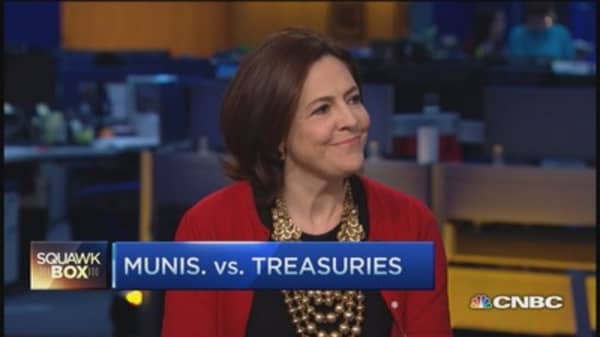Year-end is always a good time to reflect and look ahead, and the financial markets are no different. As we say goodbye to 2014, let's review some facts on the municipal bond market performance. According to the Bank of America-Merrill Lynch U.S. Muni index, municipal bonds had a great year, generating total returns of 9.14 percent. In fact, over the past eight years the municipal market has averaged annual returns of 5.8 percent.
The 9.14 percent performance of municipals compares well to other parts of the investment-grade market. For the past 52 weeks, the indexes of Treasurys, Agency debentures, Agency MBS and high grade corporate posted returns of 5.5 percent, 3.6 percent, 6.9 percent and 7.0 percent, respectively.
Read MoreRun away from Puerto Rico muni bonds: Lebenthal
Even with the strong performance, munis remain relatively cheap when compared to Treasurys. 10-year munis are trading at 93.77 percent of Treasurys (2.11 percent yield on munis vs. 2.25 percent on Treasurys), and 30-year munis are trading at 97.67 percent of Treasurys (2.93 percent vs. 3 percent). Recall that on an after-tax basis, this suggests that munis are outyielding Treasurys by almost 150 basis points (for 30-year maturities) if you are in a 35-percent tax bracket. These levels are the cheapest of the year, because as the Treasury market has rallied in recent weeks, munis have lagged due to relatively high levels of supply in the market.
Looking ahead to 2015, don't expect the recent supply-driven cheapness in munis to hold steady. There is some seasonality to municipal bond issuance, and the first part of the first quarter is typically a light period for new supply. In general, overall supply was low in 2014, coming in at $325 billion, and market observers expect next year to come in at around the same level. (By comparison, municipal issuance in 2012 and 2013 totaled $420 billion and $458 billion, respectively.)
On the credit front, expect some of the same stories to stay in the news. In Puerto Rico, market participants are watching to see if the Electric Power Authority will be able to make its January debt payment; in general, the market expects the Authority will not make it, although low oil prices may prove to be a wild card. The Detroit bankruptcy debacle should continue to reverberate through the market, too. Otherwise, as long as the overall economic performance in the U.S. continues to trend positively, expect credit performance to be within historical norms while those identified problem spots continue to bear watching.
Read More Detroit's $3.7 trillion wake-up call to the muni market
Depending on how they play out, there are three other exogenous forces that have the potential to turn 2015 better or worse than 2014: Federal Reserve policy, the housing market and tax policy. This fall, the Fed ended its quantitative easing buying and, after its last monetary-policy meeting, the Fed edged closer to a possible increase in the Fed funds rate. The yield curve may exhibit some rate volatility as this plays out. In housing, which is an important driver of the municipal tax base, we have seen some strong performance as the market has pulled out from the worst of the Great Recession, but potentially higher mortgage rates and a cooling off phase could make itself felt in muniland. As for a change in tax policy, some in Congress have floated trial balloons that could affect the relative attractiveness of municipals — a surcharge on muni rates, or a cap on tax-free income, for example. While Congress has proven that it lacks the bipartisan cohesiveness to get any significant legislation passed, the strengthening of the Republicans' hand after the mid-terms may be enough to change the narrative.
In muniland, investors are happy for now, but the impulse to project current results into the future should be tempered.
Commentary by Alexandra Lebenthal, CEO and president of Lebenthal Holdings LLC.
Disclosure: The opinions expressed in this article are those of the author, and do not reflect the opinions of Lebenthal & Co., LLC, a FINRA-registered broker-dealer. Follow her on Twitter @alebenthal.




